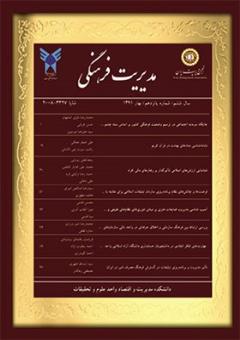امداد جامعه شهری تهران با رویکرد توسعه پایدار فرهنگسراها ( مطالعه موردی: فرهنگسراهای شهر تهران)
محورهای موضوعی : مدیریت فرهنگی
1 - دانشجوی دکتری جامعه شناسی- جامعه شناسی فرهنگی، دانشگاه آزاد واحد علوم و تحقیقات تهران. ایران
کلید واژه: اعتماد, مشارکت و امداد, فرهنگسرا, توسعه ی پایدار,
چکیده مقاله :
مقدمه و هدف پژوهش: توسعهی پایدار به معنای تحقق اهداف اقتصادی، اجتماعی و زیست محیطی برای حداکثرسازی رفاه و سلامت انسان فعلی بدون آسیب رساندن به توانایی نسل های بعدی جهت کاهش مسائل، رنج های انسانی و برآوردن نیازهای او می باشد؛ و زمانی این هدف میسر می شود که ذخایر سرمایه ای سرمنشاء کاهش نیابد. بدین ترتیب سرمایه در مفهوم توسعه پایدار، انسان، گروههای اجتماعی، محیط زیست، فرهنگ و تاریخ را شامل میگردد. امروزه فرهنگسراها با وجود امکانات زیرساختی، معماری و فضای مناسب کمتر متناسب با اهداف توسعهای خود پیش میروند و خلاءهایی در حوزه برنامهریزی توسعهای دارند که قابل تامل و بررسی است. پژوهش حاضر از نظر نوع هدف، توسعهای و راهبردی بوده و از نظر روش گردآوری دادهها، اکتشافی محسوب میشود. روش پژوهش: به کمک روش تحقیق کیفی مدل تحلیلی SWOT نقاط قوت و ضعف، فرصت ها و تهدیدهای فرهنگسراها در حوزه توسعه پایدار در بین 103 نفر از کارکنان فرهنگسرای شهر تهران، از جمله فرهنگسراهای برخوردار مانند فرهنگسرای خاوران (منطقه 15)، فرهنگسرای بهمن (منطقه 16)، فرهنگسرای اشراق (منطقه 4) و فرهنگسرای فردوس (منطقه 5) و نیز فرهنگسراهای کم برخوردار مانند فرهنگسرای مهر (منطقه 19) و فرهنگسرای دانش (منطقه 21) کسب و تجزيه و تحليل اطلاعات انجام شده است. يافتهها: به لحاظ مسايل دروني، بيروني و کارکرد فرهنگسرا در توسعه ی پایدار، کمک به جامعه شهری به واسطه ترویج گرایش هنجاری به مشارکت و اعتماد به مثابه دو جریان مهم فرهنگی در کنش اجتماعی شهروندان؛ از طریق توانمندسازی و آموزش موثر و گسترش سرمایه اجتماعی میسر است. نتيجه گيري: از این رو استراتژی ها و پیشنهادهای چون سیاستگذاری واحد، ادغام معاونت اجتماعی و سازمان فرهنگی شهرداری، توجه به نیاز مخاطب و جذب جوانان، کیفی سازی نیروی انسانی و ظرفیت برنامه ها و امکانات فرهنگسرا در حوزه بهبود روند و مدیریت توسعه پایدار جهت بهره برداری از توسعه ی پایدار پیشنهاد شده است.
Introduction and purpose of the research: sustainable development means the realization of economic, social and environmental goals to maximize the welfare and health of the current human being without harming the ability of future generations to reduce human problems, sufferings and meet their needs; And this goal will be possible when the original capital reserves do not decrease. Thus, capital in the concept of sustainable development includes people, social groups, environment, culture and history. Today, cultural centers, despite the infrastructural facilities, architecture and suitable space, are less suitable for their development goals and have gaps in the field of development planning that can be considered and investigated. The current research is developmental and strategic in terms of the type of goal and exploratory in terms of the data collection method. Research method: with the help of the qualitative research method of the SWOT analytical model, the strengths and weaknesses, opportunities and threats of cultural centers in the field of sustainable development among 103 employees of cultural centers in Tehran, including privileged cultural centers such as Khavaran Cultural Center (Region 15), Bahman Cultural Center ( Region 16), Eshraq Cultural Center (Region 4) and Ferdous Cultural Center (Region 5) as well as less privileged cultural centers such as Mehr Cultural Center (Region 19) and Danesh Cultural Center (Region 21). Findings: In terms of internal and external issues and the function of cultural centers in sustainable development, helping the urban society by promoting the normative tendency to participation and trust as two important cultural flows in the social action of citizens; It is possible through empowerment and effective education and expansion of social capital. Conclusion: Therefore, strategies and proposals such as single policy making, integration of social vice and municipal cultural organization, paying attention to the needs of the audience and attracting young people, improving the quality of human resources and the capacity of cultural center programs and facilities in the field of improving the process and managing sustainable development for The use of sustainable development is suggested.
امام جمعه، فرهاد،1395، جامعه شناسی فرهنگی، تهران: بهمن برنا، چاپ پنجم.
فاضلی، محمد، 1389، ارزیابی تاثیرات اجتماعی، انتشارات جامعه شناسان. تهران.
خادمی، امیرحسین، محمدرحیم رهنما و مسعود زمانی پور، 1400، تحلیل چالشهای پیش روی توسعه پایدار اجتماعی- نهادی و اقتصادی کلانشهرهای ایران برنامه ریزی منطقه ای تابستان 1400 - شماره 42 علمی-پژوهشی (وزارت علوم)/ISC 14صفحه - از 4 تا 17
کریمیان، رضا،1400 ، ارزیابی اجرایی شدن حداقل شاخص های مدیریت انرژی در سازمان ها، مطالعات آینده پژوهی و سیاستگذاری بهار 1400، دوره هفتم - شماره 22 /22 صفحه - از 1 تا 22
لفت ویچ، آدریان. 1385، دولت های توسعه گرا: پیرامون اهمیت سیاست توسعه، ترجمه جواد افشارکهن، انتشارات مرندیز، نی نگار.
معصومی جهتلو، مریم ، حبیب پاسالارزاده و غلامرضا جعفری نیا، 1400، بررسی عوامل جامعه شناختی موثر بر توسعه پایدار شهری در منطقه پارس جنوبی با تاکید بر مخاطرات زیست محیطی برنامه ریزی منطقه ای تابستان 1400 - شماره 42 علمی-پژوهشی (وزارت علوم)/ISC 12صفحه - از 192 تا 203
نعیمیان احسان و محمدعلی کیانی، 1398، اصول طراحی فضاهای شهری انسان محور با رویکرد بازآفرینی، نهمین کنفرانس بینالمللی توسعه پایدار و عمران شهری، اصفهان.
نوابخش، مهرداد، ارجمندسیاه پوش، اسحق، 1388، مبانی توسعه پایدار شهری، انتشارات جامعه شناسان، تهران.
Hawkes,J. 2004, The Fourth Pillor Of Sustainability-Cultural Essential Role in public Planning, Victoria: Cultural
Development Network.
Heyden,D. 1995, The Power Of Place-Urban Landscapes as Public History, Cambridge: MIT press.
Ladry,C,2000,The CreativeCity: A Toolkit for Urban Innovators, Stroud: Comedia/Earthscan.
Landry,C, 2006, The Art of City-Making, London: Earthscan.
Mishra ,P, 2017,International Journal of Organizational Analysis, Vol. 25 Issue: 5, pp.762-788
Soatla, 2015, Procedia Economics and Finance, Volume 24, 2015, Pages 13–17.
Prince Antwi-Afari∗ , De-Graft Owusu-Manu, Barbara Simons, Caleb Debrah, Frank Ato Ghansah, https://doi.org/10.1016/j.sftr.2021.100044
Yan yan, Chang, S, 2018, Publisher : Elsevier - Science Direct, Journal : Journal of Cleaner Production, Volume 178, 20 March 2018, Pages 67-75.


